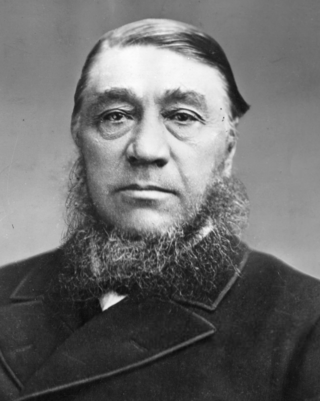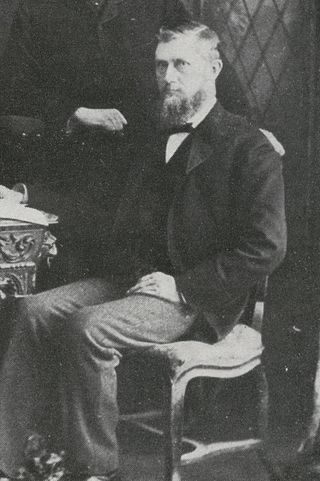
Mahikeng, formerly known as Mafikeng and alternatively known as Mafeking, is the capital city of the North West province of South Africa.

The Cape Colony, also known as the Cape of Good Hope, was a British colony in present-day South Africa named after the Cape of Good Hope. It existed from 1795 to 1802, and again from 1806 to 1910, when it united with three other colonies to form the Union of South Africa, then became the Cape Province, which existed even after 1961, when South Africa had become a republic, albeit, temporarily outside the Commonwealth of Nations (1961–94).

Stephanus Johannes Paulus Kruger, better known as Paul Kruger, was a South African politician. He was one of the dominant political and military figures in 19th-century South Africa, and State President of the South African Republic from 1883 to 1900. Nicknamed Oom Paul, he came to international prominence as the face of the Boer cause—that of the Transvaal and its neighbour the Orange Free State—against Britain during the Second Boer War of 1899–1902. He has been called a personification of Afrikanerdom and admirers venerate him as a tragic folk hero.

The Orange Free State was an independent Boer-ruled sovereign republic under British suzerainty in Southern Africa during the second half of the 19th century, which ceased to exist after it was defeated and surrendered to the British Empire at the end of the Second Boer War in 1902. It is one of the three historical precursors to the present-day Free State province.

Hercules George Robert Robinson, 1st Baron Rosmead,, was a British colonial administrator who became the 5th Governor of Hong Kong, then 13th Governor of Ceylon, and subsequently, the 14th Governor of New South Wales, the first Governor of Fiji, and the 8th Governor of New Zealand. Later in his career he held various positions in Southern Africa, including two terms as Governor of the Cape Colony. From June 1859 until August 1896, he was known as Sir Hercules Robinson.

The First Boer War, was fought from 16 December 1880 until 23 March 1881 between the British Empire and Boers of the Transvaal. The war resulted in a Boer victory and eventual independence of the South African Republic. The war is also known as the First Anglo–Boer War, the Transvaal War or the Transvaal Rebellion.

The Republic of Stellaland was, from 1882 to 1883, a Boer republic located in an area of British Bechuanaland, west of the Transvaal. After unification with the neighbouring State of Goshen, it became the United States of Stellaland from 1883 to 1885.

The Boer republics were independent, self-governing republics formed by Dutch-speaking inhabitants of the Cape Colony and their descendants. The founders – variously named Trekboers, Boers, and Voortrekkers – settled mainly in the middle, northern, north-eastern and eastern parts of present-day South Africa. Two of the Boer republics achieved international recognition and complete independence: the South African Republic and the Orange Free State. The republics did not provide for the separation of church and state, initially allowing only the Dutch Reformed Church, and later also other Protestant churches in the Calvinist tradition. The republics came to an end after the Second Boer War of 1899–1902, which resulted in British annexation and later incorporation of their lands into the Union of South Africa.

The Bechuanaland Protectorate was a protectorate established on 31 March 1885 in Southern Africa by the United Kingdom. It became the Republic of Botswana on 30 September 1966.

British Bechuanaland was a short-lived Crown colony of the United Kingdom that existed in southern Africa from its formation on 30 September 1885 until its annexation to the neighbouring Cape Colony on 16 November 1895. British Bechuanaland had an area of 51,424 square miles (133,190 km2) and a population of 84,210. Today the region forms part of South Africa.
This is a survey of the postage stamps and postal history of Bechuanaland Protectorate.

Sir Charles Warren was an officer in the British Royal Engineers. He was one of the earliest European archaeologists of the Biblical Holy Land, and particularly of the Temple Mount. Much of his military service was spent in British South Africa. Previously he was Commissioner of Police of the Metropolis, the head of the London Metropolitan Police, from 1886 to 1888 during the Jack the Ripper murders. His command in combat during the Second Boer War was criticised, but he achieved considerable success during his long life in his military and civil posts.

Vryburg is a large agricultural town with a population of 85 820 situated in the Dr Ruth Segomotsi Mompati District Municipality of the North West Province of South Africa. It is the seat and the industrial and agricultural heartland of the district of the Bophirima region.

Sir Thomas Charles Scanlen was a politician and administrator of the Cape Colony.

The South African Wars, including but also known as the Confederation Wars, were a series of wars that occurred in the southern portion of the African continent between 1879 and 1915. Ethnic, political, and social tensions between European colonial powers and indigenous Africans led to increasing hostilities, culminating in a series of wars and revolts, which had lasting repercussions on the entire region. A key factor behind the growth of these tensions was the pursuit of commerce and resources, both by countries and individuals, especially following the discoveries of gold in the region in 1862 and diamonds in 1867.
This is a survey of the postage stamps and postal history of British Bechuanaland.

Goshen, officially known as the State of Goshen, was a short-lived Boer republic in southern Africa founded by Boers expanding west from Transvaal who opposed British advance in the region.

The flag of Stellaland was the official flag of the short-lived southern African Republic of Stellaland, which existed from 1883 to 1885.

John Mackenzie was a Scottish Christian missionary who worked in Southern Africa, and who argued for the rights of the native Africans.

Batswana nationality law is regulated by the 1966 Constitution of Botswana, as amended; the Citizenship Act 1998, and its revisions; and international agreements entered into by the government of Botswana. These laws determine who is, or is eligible to be, a national of Botswana. The legal means to acquire nationality, formal legal membership in a nation, differ from the domestic relationship of rights and obligations between a national and the nation, known as citizenship. The Botswana nationality is typically obtained on the principle of jus sanguinis, i.e. by birth to parents with Botswana nationality. It can be granted to persons who have lived in the country for a specific period of time, who have performed distinguished service to the nation or who have an affiliation to the country through naturalisation.

















